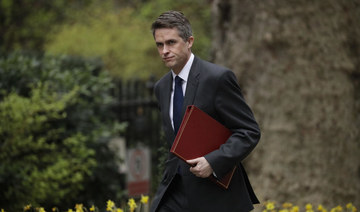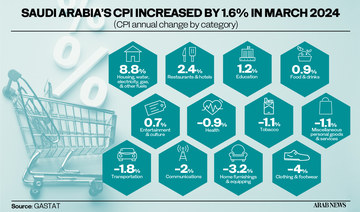WASHINGTON: Donald Trump stepped up his battle against Huawei Wednesday, effectively barring the Chinese telecom giant from the US market and adding it to a blacklist restricting US sales to the firm amid an escalating trade war with Beijing.
An executive order signed by the president prohibits purchase or use of equipment from companies that pose “an unacceptable risk to the national security of the United States or the security and safety of United States persons.”
“This administration will do what it takes to keep America safe and prosperous and to protect America from foreign adversaries,” White House spokeswoman Sarah Sanders said.
A senior White House official insisted that no particular country or company was targeted in the “company- and country-agnostic” declaration.
However, the measure — announced just as a US-China trade war deepens — is widely seen as prompted by already deep concerns over an alleged spying threat from Huawei.
“Restricting Huawei from doing business in the US will not make the US more secure or stronger; instead, this will only serve to limit the US to inferior yet more expensive alternatives,” Huawei said in a statement.
“In addition, unreasonable restrictions will infringe upon Huawei’s rights and raise other serious legal issues,” it said.
The Commerce Department followed up with a more direct hit on the tech giant, adding it to a blacklist that will make it much harder for the firm to use crucial US components in its array of phones, telecom gear, databases and other electronics.
Commerce’s Bureau of Industry and Security (BIS) said it would add Huawei and its affiliates to its “entity list” over alleged Iran sanctions violations.
The listing requires US firms to get a license from BIS for the sale or transfer of American technology to a company or person on the list.
“A license may be denied if the sale or transfer would harm US national security or foreign policy interests,” a Commerce Department statement said.
“This will prevent American technology from being used by foreign-owned entities in ways that potentially undermine US national security or foreign policy interests,” Commerce Secretary Wilbur Ross said.
Huawei did not immediately comment on the blacklisting.
US officials have been trying to persuade allies not to allow China a role in building next-generation 5G mobile networks, warning that doing so would result in restrictions on sharing of information with the United States.
US government agencies are already banned from buying equipment from Huawei, a rapidly expanding leader in the 5G technology.
Beijing was already furious about US moves to limit use of equipment from Chinese firms including Huawei and another company ZTE.
“For some time, the United States has abused its national power to deliberately discredit and suppress by any means specific Chinese enterprises, which is neither honorable nor fair,” foreign ministry spokesman Geng Shuang said ahead of Trump’s executive order.
“We urge the US side to stop the unreasonable suppression of Chinese enterprises on the pretext of national security and to provide a fair and non-discriminatory environment,” the spokesman said.
The US portrayal of Huawei as a national security danger dovetails with Washington’s wider complaint that Chinese companies are unfairly protected by the state, making fair trade impossible.
The move also threatens to further flare trade tensions just days after the US more than doubled tariffs on $200 billion of Chinese imports, which was met with a retaliation in kind by Beijing.
Washington and some European allies fear that Chinese economic expansion, particularly in the Belt and Road global infrastructure program, is part of a bid for geopolitical dominance.
Amid those worries, Huawei is portrayed as a Trojan horse that could leverage its ultra-rapid telecoms technology into a Chinese government spy network reaching deep into American society and business fields.
“Chinese telecom companies like Huawei effectively serve as an intelligence-gathering arm of the Chinese Communist Party,” Senator Cotton said after Trump’s emergency declaration.
“The administration is right to restrict the use of their products.”
So far, the US campaign to lobby other countries to turn their backs on Huawei has had mixed results.
Even Britain, one of Washington’s closest allies, is mired in debate over whether to follow the US lead or allow Huawei to develop the 5G networks.
On Tuesday, the chairman of the company, Liang Hua, visited London to insist that Huawei will “commit ourselves, to commit our equipment to meeting the no-spy, no back-door standards.”
Donald Trump ramps up battle against Chinese telecom giant Huawei
Donald Trump ramps up battle against Chinese telecom giant Huawei
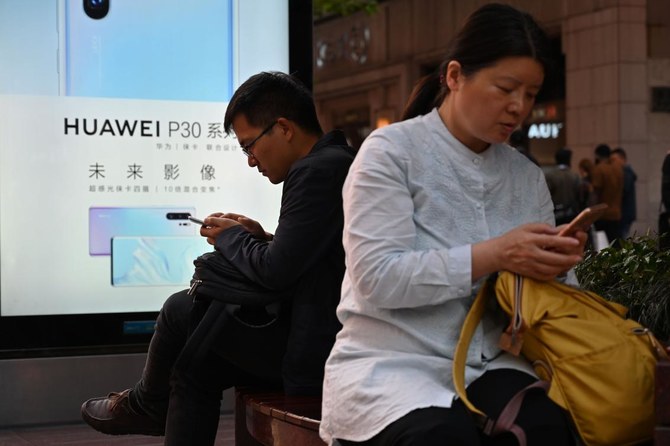
- ‘This administration will do what it takes to keep America safe and prosperous and to protect America from foreign adversaries’
- US officials have been trying to persuade allies not to allow China a role in building next-generation 5G mobile networks
Global airline body calls for release of $720 million in held revenues by Pakistan, Bangladesh
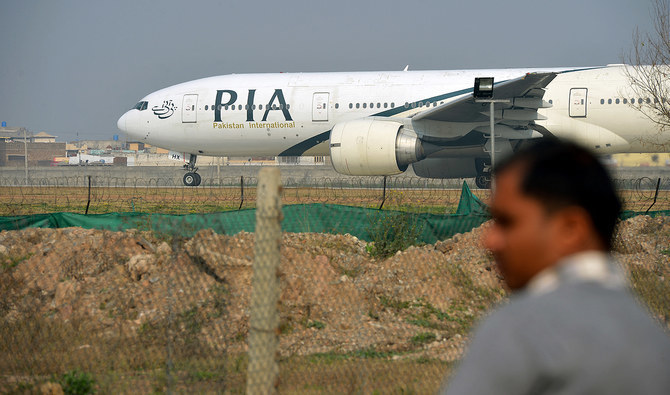
- IATA asks Pakistan in a statement to simplify the ‘onerous’ repatriation process causing ‘unnecessary delays’
- The international organization says airlines are unable to repatriate $399 million from the Pakistani market alone
KARACHI: The International Air Transport Association (IATA) on Wednesday asked Pakistan and Bangladesh to release airline revenues amounting to $720 million, saying the two countries were holding it in contravention of international agreements.
IATA, an international organization representing the global airline industry, asked Pakistan to simplify the “onerous” repatriation process involving audit and tax exemption certificates in a statement, pointing out such procedures caused “unnecessary delays.”
Bangladesh, it said, had a more standardized system, though aviation needed to be a higher central bank priority to facilitate access to foreign exchange.
“The situation has become severe with airlines unable to repatriate over $720 million ($399 million in Pakistan and $323 million in Bangladesh) of revenues earned in these markets,” the statement informed.
IATA’s regional vice president for Asia-Pacific Philip Goh emphasized that the timely repatriation of revenues to different countries was critical for payment of dollar denominated expenses such as lease agreements, spare parts, overflight fees and fuel.
“Delaying repatriation contravenes international obligations written into bilateral agreements and increases exchange rate risks for airlines,” he said. “Pakistan and Bangladesh must release the more than $720 million that they are blocking with immediate effect so that airlines can continue to efficiently provide the air connectivity on which both these economies rely.”
Goh maintained that his organization recognized the two governments were facing difficult challenges, making it necessary for them to determine how to utilize foreign currencies strategically.
“Airlines operate on razor-thin margins,” he continued. “They need to prioritize the markets they serve based on the confidence they have in being able to pay their expenses with revenues that are remitted in a timely and efficient fashion.”
He pointed out reduced air connectivity limited the potential for economic growth, foreign investment and exports, adding such large sums of money involved in the Pakistani and Bangladeshi markets necessitated urgent solutions.
Saudi Arabia to develop 320k new hotel rooms by 2030: Knight Frank
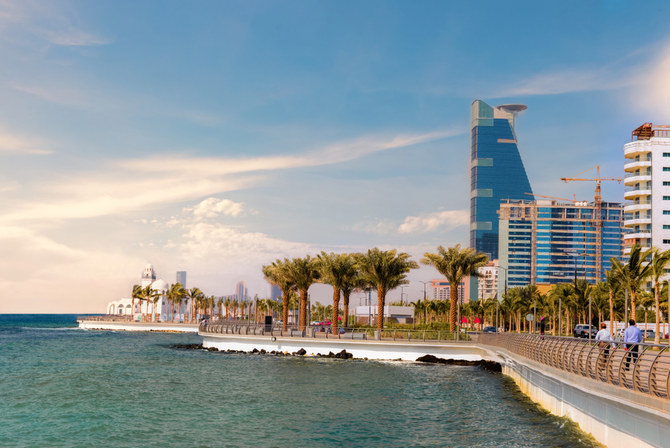
RIYADH: Saudi Arabia is gearing up to expand its hospitality sector by developing 320,000 new hotel rooms by 2030, according to an analysis by global property giant Knight Frank.
The consultancy’s study disclosed that as much as 67 percent of the planned hotel room supply in the Kingdom would fall in the “upscale” or “luxury” categories, referring to 4-star and 5-star accommodations, respectively.
This move aims to cater to the projected surge in tourism, with 150 million domestic and international tourists expected by 2030.
“With a target of welcoming 150 million visitors by 2030—a 50 percent increase from its previous goal—the government is actively exploring various strategies to attract to international travelers,” Partner and Head of Hospitality at Tourism and Leisure Advisory in Middle East and Africa Turab Saleem said.
Saleem noted that this includes the development of cultural and entertainment offerings nationwide, which complement existing attractions like the Jeddah F1 Grand Prix and numerous entertainment seasons.
“Noteworthy additions include theme parks such as Boulevard World in Riyadh, alongside the licensing of 24 additional theme parks by the Saudi General Entertainment Authority over the past year,” he added.
Oil Updates – prices climb amid US stocks decline, Middle East conflict
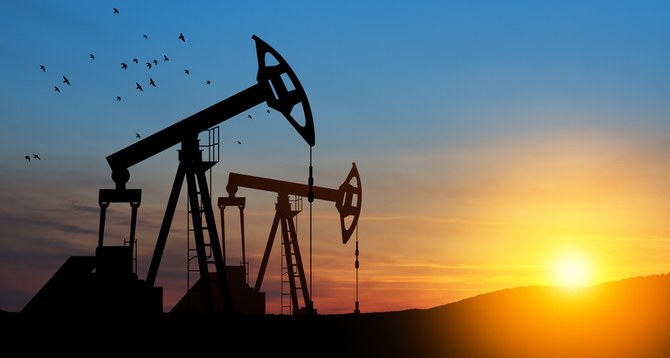
TOKYO: Oil prices extended gains on Wednesday after industry data showed a surprise drop in US crude stocks last week, a positive sign for demand, though markets were also keeping a close eye on hostilities in the Middle East, according to Reuters
Brent crude futures rose 26 cents, or 0.29 percent, to $88.68 a barrel and US West Texas Intermediate crude futures climbed 26 cents, or 0.31 percent, to $83.62 a barrel at 9:34 a.m. Saudi time.
US crude inventories fell 3.237 million barrels in the week ended April 19, according to market sources citing American Petroleum Institute figures. In contrast, six analysts polled by Reuters had expected a rise of 800,000 barrels.
Traders will be watching for the official US data on oil and product stockpiles due at 5:30 p.m. Saudi time for confirmation of the big drawdown.
US business activity cooled in April to a four-month low, with S&P Global saying on Tuesday that its flash Composite PMI Output Index, which tracks the manufacturing and services sectors, fell to 50.9 this month from 52.1 in March.
“This could help convince policy makers that rate cuts are required to support the economy,” ANZ analysts said in a note.
US interest rate cuts could bolster economic growth and, in turn, demand for oil from the world’s top consumer of the fuel.
Analysts were still bullish that any latest developments in conflicts in the Middle East will still support markets, though the impact on oil supplies remains limited for now.
“Overall, crude oil prices are well supported around current levels by on-going Middle East risk premium. On the topside, risk of possible renewed OPEC production increase from Jun will help limit any significant upside,” said head of markets strategy for United Overseas Bank in Singapore Heng Koon How.
“We maintain our forecast for Brent to consolidate at USD 90/bbl by end of this year,” Heng added.
Israeli strikes intensified across Gaza on Tuesday, in some of the heaviest shelling in weeks.
“Recent reports suggest that both Iran and Israel consider the current operations concluded against one another, with no follow-up action required for now,” ING analysts said in a note.
“The US and Europe are preparing for new sanctions against Iran – although these may not have a material impact on oil supply in the immediate term,” they added.
Pakistan Stock Exchange hits record high, breaks 72,000 points in intraday trade
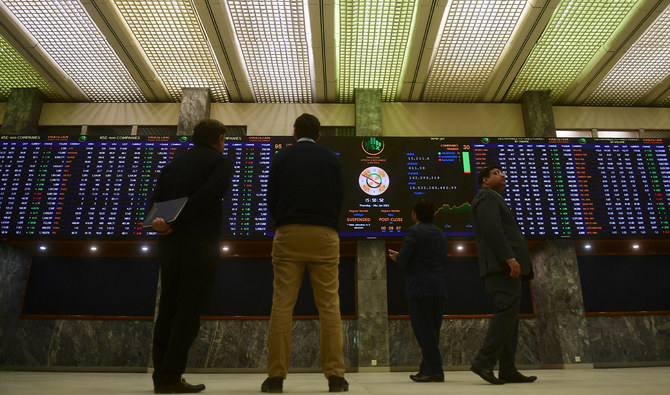
- Analysts say investors expect a significant decline in April inflation data that may lead to a cut in interest rates
- The Pakistani bourse has recently been trading at record highs due to hopes of positive loan talks with the IMF
ISLAMABAD: Pakistan’s benchmark share index breached the key level of 72,000 to trade at a record high of 72,414 points during intraday trade earlier on Wednesday, according to data from the Pakistan Stock Exchange website.
The Pakistani bourse has recently been trading at record highs amid positive sentiment prevailing among investors due to hopes of the country’s successful talks with the International Monetary Fund (IMF) for a new loan program.
The country’s finance minister, Muhammad Aurangzeb, recently visited Washington to hold talks with IMF officials for a long-term bailout facility as Pakistan’s current $3 billion program is due to expire this month.
The finance minister expressed hopes the outline of the new program would soon become visible, adding that the loan would help Pakistan continue with structural economic reforms.
“After a record current account surplus, investors are now expecting a big fall in April inflation data that may result in a cut in interest rates in the coming months,” Sohail Mohammed, CEO of Karachi-based brokerage company Topline Securities, told Reuters.
Pakistan’s benchmark KSE100 index has surged 75.5 percent over the past year and is up 11.5 percent year-to-date.
The equity market is expected to surge further as an IMF delegation arrives in Pakistan next month to determine the contours of the new loan facility.
“We are still hoping that we can get into a staff-level agreement [with the IMF] by the time June is done or early July so that we can move on,” the finance minister said on Tuesday while addressing a news conference in Islamabad.
With input from Reuters
Saudi Arabia’s non-oil exports surge by 4.4%: GASTAT
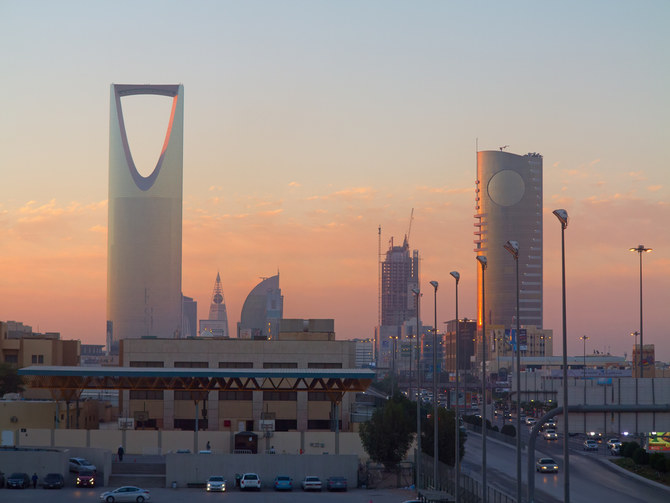
RIYADH: Saudi Arabia’s non-oil exports, including re-exports, saw a surge of 4.4 percent in February compared to the same period of 2023, official data showed.
According to the General Authority for Statistics, the total value of this sector reached SR21.86 billion ($5.83 billion), marking a rise from SR20.93 billion in the same period of the previous year.
The increase in non-oil shipments was driven by an 8.3 percent surge in the exports of rubber and plastic products in February, constituting 24.1 percent of the total exports.
Strengthening the non-oil private sector remains pivotal for Saudi Arabia, as the Kingdom continues its economic diversification efforts aimed at reducing reliance on oil.
The report unveiled a 4.1 percent year-on-year decrease in the Kingdom’s non-oil exports, excluding re-exports, in February. Conversely, the value of re-exported goods surged by 32.3 percent during the same period.
However, GASTAT noted that Saudi Arabia’s overall merchandise shipments decreased by 2 percent in February compared to the year-ago period.
This decline was primarily attributed to a 3.8 percent decrease in oil exports in February compared to the same month in 2023, according to the report.
Similarly, the percentage of oil shipments out of total exports decreased to 77 percent in February from 78.4 percent in the same period of the previous year.
The fall in oil exports was due to the Kingdom’s decision to reduce crude output, aligned with an agreement by the Organization of the Petroleum Exporting Countries, and its allies, collectively known as OPEC+.
In April 2023, Saudi Arabia reduced oil output by 500,000 barrels per day, a decision the Energy Ministry has now extended until the end of December 2024.
Compared to January 2024, the value of overall merchandise exports witnessed a marginal rise of 0.1 percent to SR95.02 billion.
GASTAT revealed that Saudi Arabia’s imports rose by 12.3 percent year on year in February.
On the other hand, the merchandise trade balance surplus decreased by 21.8 percent compared to the year-ago period.
China was Saudi Arabia’s primary trading partner in February, with exports to the Asian country amounting to SR12.57 billion.
India and Japan followed, with SR9.43 billion and SR8.55 billion in exports, respectively.
South Korea, the UAE, and Poland were also featured among the top destinations for Saudi exports, along with Egypt, the US and France.
China also held the top spot on the import side, accounting for 19.9 percent – or SR12.58 billion – of exchanges in February.
According to the report, King Abdulaziz Sea Port in Dammam was ranked the highest entry point for goods into Saudi Arabia, constituting 26.7 percent of the overall exports.




